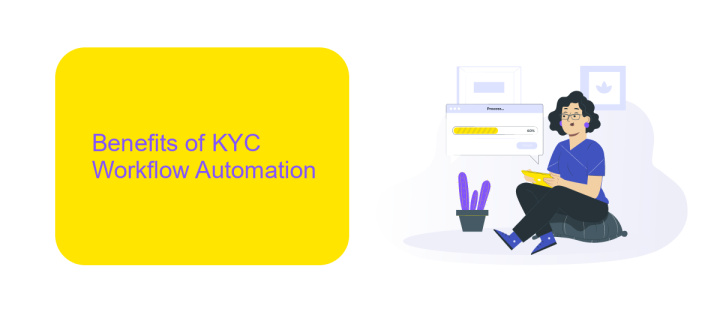KYC Workflow Automation
In today's fast-paced financial landscape, Know Your Customer (KYC) compliance is more crucial than ever. KYC workflow automation streamlines the verification process, reducing manual effort and minimizing errors. By leveraging advanced technologies, businesses can enhance efficiency, ensure regulatory compliance, and improve customer experience. This article explores the benefits and implementation strategies of KYC workflow automation.
Introduction to KYC Workflow Automation
KYC (Know Your Customer) workflow automation is transforming the way businesses verify the identity of their clients, ensuring compliance with regulatory requirements while enhancing operational efficiency. By automating repetitive tasks and streamlining data collection, companies can focus on more strategic activities and reduce the risk of human error.
- Improved accuracy and consistency in customer data verification
- Enhanced customer experience with faster onboarding processes
- Reduced operational costs through automation of manual tasks
- Increased compliance with regulatory standards
One of the key tools in achieving effective KYC workflow automation is ApiX-Drive, a service that facilitates seamless integration between various platforms and systems. By leveraging ApiX-Drive, businesses can automate data transfers and streamline their KYC processes, ensuring that all necessary information is collected and verified efficiently. This not only saves time but also minimizes the potential for errors, leading to a more reliable and compliant KYC process.
Benefits of KYC Workflow Automation

KYC workflow automation significantly enhances the efficiency of compliance processes by reducing manual intervention. Automated systems can quickly verify customer identities, cross-check against global watchlists, and flag suspicious activities. This not only accelerates the onboarding process but also minimizes human errors, ensuring a higher accuracy rate and compliance with regulatory standards. Furthermore, automation allows for continuous monitoring, which is crucial for maintaining up-to-date compliance in a constantly evolving regulatory landscape.
Another key benefit is the scalability and flexibility that KYC workflow automation offers. As businesses grow, the volume of customer data and the complexity of compliance requirements increase. Automated solutions can easily scale to handle larger datasets without compromising on speed or accuracy. Integration tools like ApiX-Drive facilitate seamless connectivity between various platforms and databases, streamlining data flow and ensuring that all systems are synchronized. This not only saves time and resources but also enhances the overall customer experience by providing a smoother and faster verification process.
Challenges of KYC Workflow Automation

Automating the KYC (Know Your Customer) workflow presents several challenges that organizations must navigate to ensure compliance and efficiency. While automation promises to streamline processes, reduce human error, and cut costs, it also brings a set of unique obstacles.
- Data Accuracy: Ensuring the accuracy of data collected through automated systems can be challenging due to discrepancies in data sources.
- Regulatory Compliance: Keeping up with constantly changing regulations across different jurisdictions requires a flexible and adaptive automation system.
- Integration Complexity: Integrating various systems and databases seamlessly can be difficult, often requiring sophisticated tools like ApiX-Drive to facilitate smooth data flows.
- Security Concerns: Protecting sensitive customer information from breaches and unauthorized access is paramount, necessitating robust security measures.
- User Acceptance: Convincing employees and customers to trust and adapt to the new automated processes can be a significant hurdle.
Despite these challenges, leveraging advanced integration services like ApiX-Drive can mitigate some of these issues by providing reliable and secure data transfer solutions. By addressing these challenges head-on, organizations can fully realize the benefits of KYC workflow automation.
Best Practices for KYC Workflow Automation

Implementing KYC workflow automation can significantly enhance the efficiency and accuracy of your compliance processes. To ensure successful automation, it is essential to follow best practices tailored to your organization's specific needs.
Firstly, thoroughly analyze your existing KYC processes to identify areas that can be automated. This includes understanding the data sources, the type of information required, and the frequency of updates. By mapping out these details, you can create a more streamlined and efficient workflow.
- Utilize reliable automation tools like ApiX-Drive to integrate various data sources seamlessly.
- Ensure data accuracy by regularly updating and validating information from trusted sources.
- Implement robust security measures to protect sensitive customer information.
- Continuously monitor and optimize the automated processes to adapt to regulatory changes.
Finally, training your team on the new automated KYC workflow is crucial. Ensure that they understand how to use the tools and interpret the data generated by the automated system. This will help in maintaining compliance and improving overall efficiency.
- Automate the work of an online store or landing
- Empower through integration
- Don't spend money on programmers and integrators
- Save time by automating routine tasks
Conclusion
The automation of KYC workflows represents a significant advancement in the efficiency and accuracy of customer verification processes. By leveraging advanced technologies, financial institutions can streamline their operations, reduce manual errors, and ensure compliance with regulatory requirements. This not only enhances customer satisfaction by providing faster service but also mitigates the risks associated with human oversight. Automated KYC workflows facilitate a more secure and reliable method for managing sensitive customer information.
Moreover, integrating services like ApiX-Drive can further optimize the KYC process by enabling seamless data integration across various platforms. ApiX-Drive allows businesses to automate data transfer and synchronization, ensuring that all necessary information is up-to-date and readily accessible. This integration capability is crucial for maintaining the integrity and accuracy of KYC data, ultimately leading to more robust and efficient compliance management. By adopting these automated solutions, organizations can achieve a higher level of operational excellence and regulatory adherence.
FAQ
What is KYC workflow automation?
How does KYC workflow automation benefit businesses?
What are the key features of a KYC workflow automation system?
Can KYC workflow automation be integrated with existing systems?
Is KYC workflow automation secure?
Apix-Drive will help optimize business processes, save you from a lot of routine tasks and unnecessary costs for automation, attracting additional specialists. Try setting up a free test connection with ApiX-Drive and see for yourself. Now you have to think about where to invest the freed time and money!


